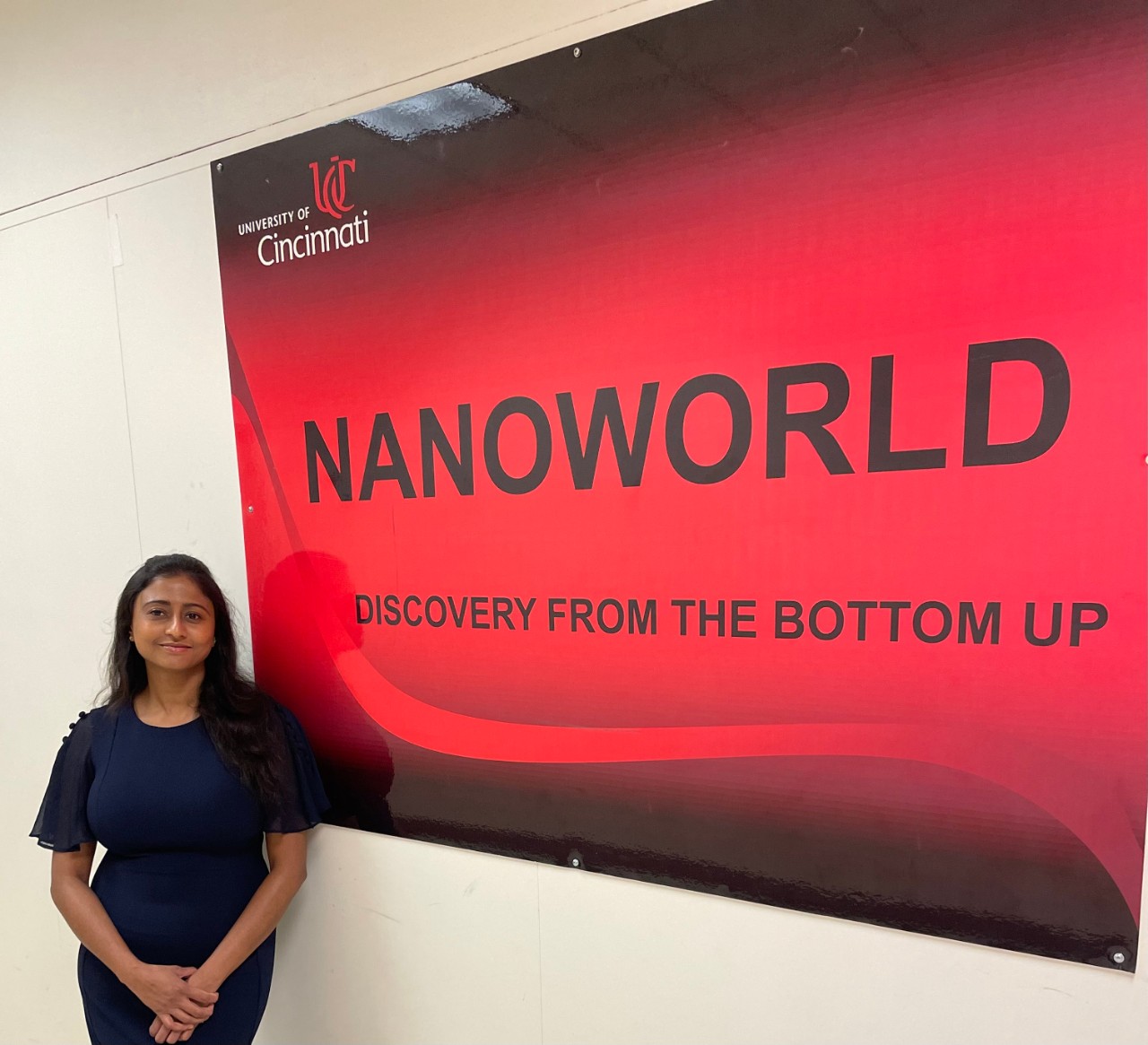
CEAS alumna at the forefront of AI chip innovation
Devika Chauhan applies graduate research to develop future AI chips at Intel
During her time as a doctoral student at the University of Cincinnati, Devika Chauhan played a vital role in elevating UC's cutting-edge research on carbon nanotube synthesis and its state-of-the-art applications. Now employed by Intel Corp., she applies the knowledge from her graduate experience at UC to develop future artificial intelligence chips.

Devika Chauhan's collaborative work at UC resulted in UC's receiving two patents for work involving carbon nanotubes. Now, she works at Intel Corp. Photo/Provided
Chauhan was attracted to UC's College of Engineering and Applied Science by its variety of research programs. Her decision to come to UC was cemented, she said, when she discovered UC's vast network of professional connections and opportunities both in Cincinnati and worldwide.
"After earning my bachelor's degree in India, I was eager to broaden my skillset and explore new opportunities," Chauhan said. "What truly captivated me about UC is its extensive network of connections. The opportunity for deep academic, professional, and research-based engagement, coupled with a University Graduate Scholarship award, teaching assistantship and research assistantship positions made UC a perfect choice for my graduate studies."
Chauhan began exploring nanotechnology during a smart structures course with professor Mark Schulz during her first semester at UC. It was there that she became fascinated by the properties of carbon nanotubes and their potential applications. Her initial curiosity and prior experience with composite structures inspired her to take a tour of Nanoworld, UC's nanotechnology lab, which ultimately played a major role in her decision to pursue a doctorate after earning her master's degree.

Devika Chauhan, left, conducted research in UC's Nanoworld laboratory with Professor Mark Schulz. Photo/Provided
While working alongside experts in nanotechnology, her curiosity for carbon nanotube research knew no bounds. The lab at UC combined with the support from faculty on campus is what solidified her decision to stay at UC to pursue a doctorate.
"Deciding to pursue a Ph.D. was a straightforward choice for me. The supportive environment at UC made it feel like a family; I always felt comfortable seeking help from professors and colleagues. Even if they couldn't assist directly, they were always willing to connect me with someone who could," she said.
During her doctoral studies, Chauhan's research primarily consisted of synthesizing carbon materials and applications, improving material properties. Some of the projects she worked on included developing heat-resistant materials to protect firefighters from fire hazards, creating high-altitude radiation shielding and contributing to a collaborative project with the U.S. Army.
Her expertise in carbon nanotube synthesis and its application led her to become a principal investigator for two projects that were funded by the National Institute for Occupational Safety and Health. Accompanying her academic studies, Chauhan was a teaching assistant for multiple semesters. Her collaborative work at UC resulted in the college's receiving two patents for work involving carbon nanotubes, more than a dozen published papers and six book chapters.
"My accomplishments at UC would not have been possible without the guidance of my mentors, including Professors Mark Schulz, Henry Spitz, Vesselin Shanov and Peter Nagy," she said.
UC has given me more than I can think of. Even now, I think of Cincinnati as home.
Devika Chauhan CEAS alumna
Chauhan said her transition from academia to the professional world was easy. She landed a job at Intel in her final semester at UC.
Thanks to her experience with nanomaterials, she started off at Intel layering materials to make conductors and connectors in the development stages of these AI chips. In her role, she tackles the challenge of yield, which is making as many chips as possible from a single wafer. This process is integral to the semiconductor industry. Chauhan's work is contributing to Intel's efforts to compete in the global AI chip market.
"UC has given me more than I can think of. Even now, I think of Cincinnati as home," she said.
Featured image at top: Devika Chauhan worked in UC's Nanoworld lab as a graduate student. Photo/Provided
Interested in learning more?
Learn more about UC's involvement in training the future workforce in the semiconductor field, including the new fabrication plants under construction by Intel in Ohio.
Related Stories
Better-fitting face masks greatly improve COVID-19 protection
June 9, 2021
University of Cincinnati researchers found that while N95 masks are effective barriers against airborne diseases like COVID-19, poorly fitting masks can have substantial leaks around the face that reduce their effectiveness and increase the risk of infection.
CEAS alumna at the forefront of AI chip innovation
September 9, 2024
During her time as a graduate student at the University of Cincinnati, Devika Chauhan, PhD played a vital role in elevating UC's cutting-edge research on carbon nanotube synthesis and its state-of-the-art applications. Now employed by Intel, she applies the knowledge from her graduate experience at UC to develop future artificial intelligence (AI) chips.
UC engineer studying renewable energy sources
January 30, 2025
Katherine Schlaak came to University of Cincinnati as a student for her bachelor’s degree in physics, and stayed for her master’s degree and doctoral degree in materials science and engineering. Her PhD research in the Energy Conversion Materials lab is related to renewable energy.
